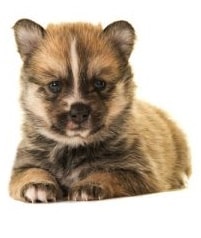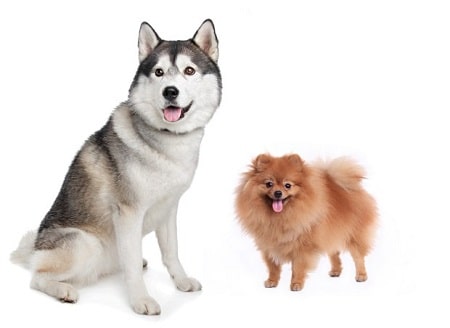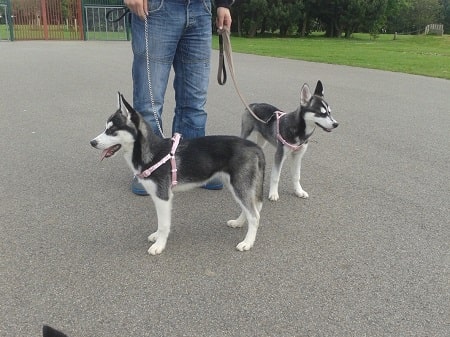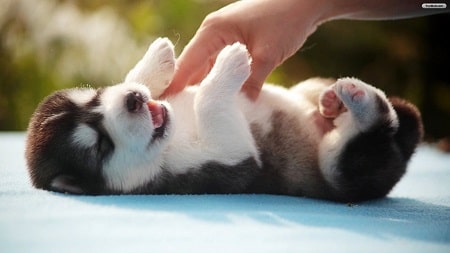Pomsky, the little fluffy miniature wolf is unique looking and will get you to fall in love at first sight. Pomskies are a cross between a Pomeranian and a Siberian Husky. It is a newcomer breed which has totally won people’s hearts. They are very fluffy and cuddly. However, due to being a hybrid there is quite a variation n the breed.
Pomsky Breed Overview

| Group: | Hybrid |
| Size: | Small-Medium (20-30 pounds) |
| Lifespan: | 12-15 Years |
| Best Suited For: | Families, singles and seniors |
| Temperament: | Intelligent, energetic, protective, loving, playful |
| Exercise Needs: | Moderate |
| Drooling Potential: | Low |
| Grooming Needs: | High |
| Similar Breeds: | Pomeranian, Siberian husky |
1. Basic features
Pomskies are new to the designer dog arena and have become quite famous lately. They were one of the most popular breeds of 2017. Pomskies are made for cold weather due to their thick coat.
Due to being a mix between a Pomeranian and a Siberian Husky, the Pomskies have mixed physical features and can be different from puppy to puppy. Also, it is difficult to predict how large your Pomsky will grow out to be.
They are usually a variation between a white, black and grey. They have a soft and long coat which requires regular brushing.
2. Pomsky Origin

The history of Pomsky is not a very long one as it is a relatively new breed. They became very famous in Europe and North America after becoming an internet sensation in 2011.
This breed was recently designed and created through artificial insemination. They cannot be naturally bred due to their sizes and potential health risks as it could endanger the mother and puppies if a smaller Pomeranian carries puppies sired by a larger male Husky. As a result of artificial insemination, they are quite expensive.
Since it is a new breed, standards of how the breed should look have not been determined yet.
3. The personality of Pomsky
Pomskies often inherit the desirable traits from both Siberian Huskies and Pomeranians. The Pomskies are playful, good-natured and lively.
They are highly protective of their owners and make great guard dogs as well.
They require early socialization as they have a tendency of becoming nervous around strangers. Pomskies do well in apartments due to their smaller size.
4. Pomsky behavior
Pomskies are often highly intelligent, loving, playful and self-assured. They possess traits that both the Siberian Husky and the Pomeranian possess in common. Like Pomeranians, the Pomskies may be skittish around children. Thus, they are not recommended for families with younger children. They may also be big barkers.
They are smart and require regular play to avoid becoming bored. Otherwise, they may take up destructive behavior like chewing. Pomskies are also diggers by nature and require an early training to avoid digging.
5. Exercise Requirements

Pomskies are very energetic and require play sessions and walks. A walk daily would suffice these needs. Pomskies have moderate exercise requirements. They love playing outside and are suitable for the cold weather due to their thick coat.
Pomsky is an intelligent dog and requires mental stimulation as well. A few toys and puzzles would keep them busy all day.
They love to play and have lots of energy which needs to be channelized correctly. If not done so, a Pomsky will turn destructive and develop various behavioral problems. They require daily playtime and will expect you to play with them.
6. Diet Needs
Pomsky has a lot of energy and thus requires the right diet to keep them healthy. They will not have similar eating habits like their parents.
A Pomsky will not eat like a Husky does, despite the fact that it is the parent breed.
It is important to remember that the Pomsky will require a diet according to its size. Since there are no breed standards, so the factor to determine a Pomsky’s diet is its size. It generally eats like small-medium sized dogs.
However, it is necessary to consult a vet for your dog’s nutrition. A high nutrition diet is recommended which meets its energy requirements.
7. Trainability
Pomskies can be stubborn like their parent Pomeranian and maybe a little difficult to handle at times. They should be handled well with calm and assertive leadership.
However, they are intelligent and respond well to training. Training should start at an early age. Leash training and potty training should start from the puppy stage. They tend to learn fast and will be willing to listen to.
However, If they sniff out you’re not an alpha, they’ll shamelessly exploit your weak side to their advantage.
So it is very important to be assertive. Failing to do so can result in increased stubbornness and behavioral problems.
Early socialization is also an important part of their training as they may be nervous around strangers. Introducing them to new people and places often and taking them to parks would do the needful.
8. Common Health Problems
As Pomsky is a newer breed, any heredity conditions are unknown. We can assume that a Pomsky has health conditions which are common to both Husky and Pomeranian. They include heart disease, knee dislocation, collapsing trachea, eye diseases, including juvenile cataracts, and skin problems.
We cannot spot all heredity health conditions in a growing Pomsky right away so it hard to predict if the puppy will be free of all the health conditions. These diseases may not be under your control. However, once you bring a pooch home it is possible to control one of the most common problems- obesity. Right diet and exercise are very important to maintain the right health of your dog.
9. Who should adopt a Pomsky

Pomskies are loving and outgoing. They are suitable for families with elder children as they may not be very comfortable around younger children. They are suitable for singles and senior citizens as well.
Pomsky does well in an apartment due to its size. However, it does require a daily exercise. If you are someone who cannot devote time to your dog’s exercise or prefer a couch potato, then a Pomsky may not be for you.
They are generally good-natured and gentle and would make a great pet!
